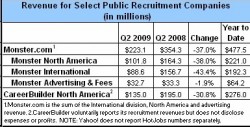Monster lost money in the 2nd quarter of the year, but by so small an amount it was mostly ignored by after hours traders, who bid up shares by 2 cents following a guardedly optimistic conference call with analysts.
Reporting Monster lost $1.4 million loss on $223 million in revenue, CEO Sal Iannuzzi said he was nonetheless “cautiously optimistic” about the job market. While he discounted any notion of a quick recovery, he told analysts on the financial call, “We are seeing encouraging signs of stabilization.”
Speaking of the company’s customers, he said they seem to be turning away from further job cuts and there’s even some signs of increased recruiting activity.
Echoing those comments, CFO Timothy Yates said the “overall tone of our discussions with customers is more positive.” He predicted that for the current (3rd) quarter, Monster would continue to see a revenue decline, but in single, rather than double, digits.
If the optimism translates into hiring activity, it would be a welcome development for an industry that has been hard hit by the global recession. For the second quarter of 2008, Monster had $354 million in revenue and earned $30.8 million.
 CareerBuilder, too, is suffering. The privately held company, which voluntarily reports only its North American revenue, saw a 31 percent drop, going from $195 million for the 2nd quarter of 2008 to $135 million for this year’s same quarter. (HotJobs numbers are not broken out by Yahoo.)
CareerBuilder, too, is suffering. The privately held company, which voluntarily reports only its North American revenue, saw a 31 percent drop, going from $195 million for the 2nd quarter of 2008 to $135 million for this year’s same quarter. (HotJobs numbers are not broken out by Yahoo.)
Wall Street had been expecting the worst, estimating Monster’s revenues at $225 million and earnings at a penny a share. Not including $5 million in legal fees from its now-settled stock backdating problems, and in reorganization and severance costs, Monster actually beat the Street, posting a 3 cent a share profit.
Earlier this week, comScore Media Metrix released U.S. traffic numbers that showed Monster up 6 percent over the last 12 months, its biggest U.S. competitor off 1 percent, while the category as a whole grew 10 percent and HotJobs jumped 23 percent. Our story on the release prompted a rebuttal by Monster’s VP of marketing, Ted Gilvar, who challenged some of the connections between traffic and market share and insisted that a change in counting by comScore (undisclosed in the release) flawed the analysis.
During the hour-long conference call today (listen to the replay here), Iannuzzi said Monster was growing its market share in revenue by taking business from its competitors, but didn’t discuss traffic. He also spoke at length about Monster’s product improvements, its relaunched website, and especially about its integration with Trovix, the job search and matching company it bought last year, and its global market plans.
Saying Monster was “unbeatable and unmatched” in the recruitment advertising market, Iannuzzi claimed the work done over the last year or more is now paying off as employers who once spread budgets among multiple sites now give “more share of wallet; in some cases, all of wallet” to Monster. The global reach of the company he called a “clear differentiator.” Monster’s presence in more than 40 nations, its reentry to Australia in partnership with CareerOne, and its planned expansion in the Middle East and Latin America, give it a leg up with multinationals who recruit globally, he said.
His most intriguing comments came during the question-and-answer session with analysts. Iannuzzi was asked about the growing pay for performance trend in job postings, a business model aggressively pushed by sites like Indeed.com and SimplyHired.com.
He said Monster was headed down that path in company with the Trovix search. He didn’t detail how PPP fits into the mix, except to say it will be a part of it. But somewhat cryptically he declared, “With the power of Trovix, we will have a value proposition that will be very attractive to our users.”
A Trovix search for recruiters is currently in beta, deployed enough weeks ago now that Darko Dejanovic, Monster’s global CIO and Chief of Product, said the recruiters testing it in candidate searches overwhelmingly prefer it to the classic, keyword search. The more and better trained they are in its use, he said, the more they like it.
Iannuzzi said the Trovix search tool is so efficient that it can reduce the number of recruiters an employer previously needed to handle the same volume of searches.
“What we will be offering very soon,” Iannuzzi said, “at the risk of overselling it, will be a game changer.”